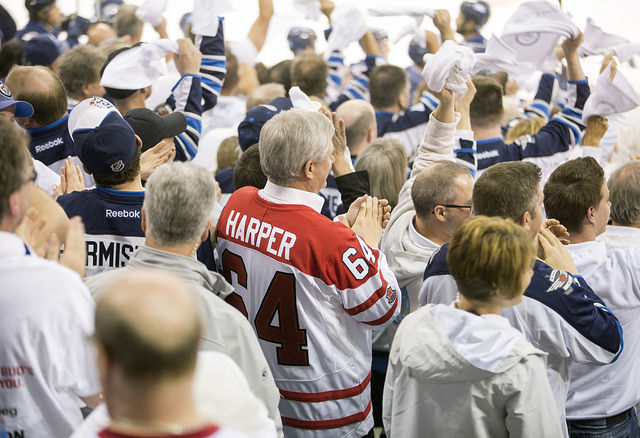Chip in to keep stories like these coming.
There are problems with having a pennant race and an election at the same time. They arise when you feel invested in both. You know you’re electorally invested if you find yourself checking polls constantly; you’re in trouble when you keep cross-checking them. You know you’re seriously invested in the pennant race if you obsessively look at standings but especially when, even on nights the Jays aren’t playing, you furtively check the Yankees score or actually watch their game to see if they’re gaining.
What problems? It’s not just that there’s massive tension to manage. You start fretting about crossover effects: could one race impact the other? When I was a student in New York in 1968, I watched the miracle Mets basically propel outsider John Lindsay to victory as mayor. If baseball upstarts could win it all, why not a longshot politician? In 1992, I worried that the Jays’ World Series run would affect the Charlottetown referendum, where I pined for a No vote. Would all those shrieking Yeses transfer to ballots?
There’s a rawer element too: guilt. How callow is it to worry as much about a ball team as your nation’s fate? We have to own our emotions but they can be so embarrassing. Sports, which involves the merely symbolic identification with a team, functions as a distraction from politics, where people’s real lives are touched and shaped. Surely a serious citizen — like a Roman senator, or me — wouldn’t be distracted by circuses, as the plebs were. Yet there I am checking ball stats as meticulously as polls. A pennant run’s just another circus, right?
On this matter I’d like to report a small course correction, over time. Sure, elections impact lives — but usually less than everyone hoped. Parties always promise more than they deliver, especially since they all converged within the neoliberal consensus 30 years ago. That was true of the Liberals in 1993 and the NDP in Ontario (1995) or Nova Scotia (2009).
I still think voting matters and I’ll support anyone with the best chance to oust Stephen Harper, but I also know it may change little. Nevertheless I care about the result. Why? Because it matters when people vote hopefully and big-heartedly for the future. It gives you faith in our species.
In other words, in elections, too, you’re rooting for your team, not just in the sense of party or leader, but in the sense of humanity, and its long-term potential for progress. So in ways, both realms are symbolic. The elections experience can be as metaphorical as the pennant race in the AL East.
There’s an obvious glitch here, which is that supporters of all parties tend to think only theirs represents true hope and progress. But I don’t think the gulfs are unbridgeable. I think most citizens have similar goals and aspirations — decent lives, health, schools, jobs. You could work toward a consensus on those (excluding racists, fanatics, etc.) But then an election gets called and everyone goes into their own dugout and emerges with a bat.
Electoral politics cuts off the chances for building social unity. Most folks’ main concern becomes beating the other team. You see it in reactions to, say, the Mansbridge interviews with leaders: depending on whose team you’re already on, you think your guy did brilliantly and the others sucked. There’s an alternative but it would mean eliminating elections and reaching decisions via serious discussion; then, when necessary, finally voting on issues. That’s how ancient Greece did it. Elections deter that; they’re actually more like pennant races than democratic exercises.
One last thought: for fans in both arenas, there can be gains in losing. I’ve been sitting in the first row greens watching the Leafs lose for decades. But last season, they were so out of it, so early, that something else took hold. Fellow fans said it became a transcendent experience, you entered another level. You watched with detachment, your gut unclenched, you appreciated new things — like the gods on Olympus gazing down as Greeks and Trojans battled on the Trojan plain.
Those gods, too, had their faves but no real skin in the game so overall it was entertaining and enlightening. Not a bad experience to savour. Then, perhaps, you return to either fray, refreshed and ready for further rounds.
This column was first published in the Toronto Star.
Photo: pmwebphotos/flickr
Chip in to keep stories like these coming.




